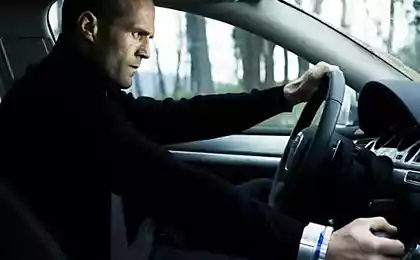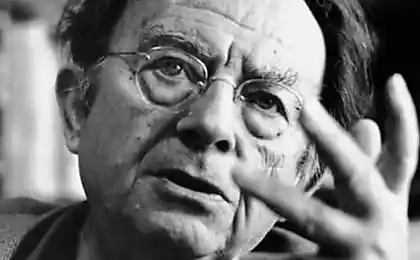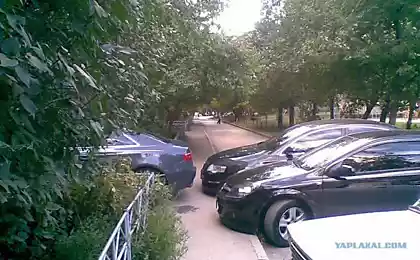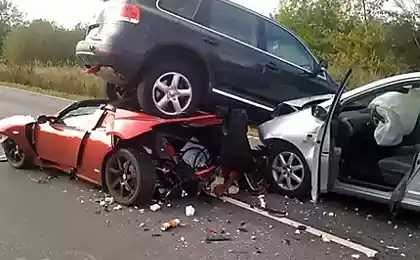646
The psychology of taxis or the person behind the wheel
Seventy four million three hundred seventy nine thousand nine hundred forty
Generally, after autopsychology got into the field of my interests, I first decided to learn how this area of psychology is studied in our country. And, to my great regret, for just a huge amount of research in the West, experience and knowledge that they have, we respond to virtually nothing. And it seems to be clear: until the second half of the 20th century the automobile was a luxury, "they" since the beginning of the 1900s, the automobile was a means of transportation. But for more than 20 years, the motorization of our country by leaps and strides steps on why things are there?
Catastrophic statistics of deaths in road accidents tells us that every year on the roads of Russia killed almost 30 thousand people and about 200 thousand more are injured and maimed. 30 000 people! This is slightly more than the population of the little village where I live. And as it is not strange that more than 80% of accidents are caused by man. Why comparing accident statistics in Russia and Sweden, equating proportionally to its population, we get a difference of more than 5 times not in our favor?
And is true the question may arise about the safety of the fleet in Russia and Sweden. And I can answer. Naturally, the number of outdated cars do not fit into any normal security, we have to order more. But at the same proven active security that stimulate the driver to a more relaxed, but aggressive and dangerous manner of driving and the other not nearly as important a question, why the driver got into the car with a very weak passive safety, very quickly forgets about it.
So what happens to a man when he gets behind the wheel. Why the driving means high risk, we often forget about this. The answer to this question is very simple, we are people. With all the usual issues that we bring behind the wheel. Our mood, character, quirks and complexes. While driving for most of us, the most dangerous activity that we have ever done. And maybe that's why we (most of us) supported myself with the fact that scitaem your skills of car control is above average. This phenomenon is called "optimistic distortion", I can assure you, in reality, we feel worse than we do imagine, but the average rating is caused by the fact that clear criteria for the evaluation of driving skill there. But the traffic is as emotional problem as a physical and mechanical. Traffic is a living laboratory of human relations, where it is invisible at first glance of strength and weakness. And we know and understand them very badly. Somehow, autostrategy and autonomically much closer and more to our drivers than autopsychology. Much easier to explain his aggressive management style that you Aries horoscope than their systems and attempts to assert themselves in the anonymous crowd. And we met with inadequate driver on the road, wondering where so many of them taken, because outside of the car we are surrounded by quite a decent, quiet and nice people. As said by the taxi driver from the movie Brother 2: "there were also normal people...".
And here arises, in principle, some of the main issues of autopsychology whether the identity of the person behind the wheel of the same person, that in everyday life outside the car. The road is more than a system of rules and structures. And there is no other place where so many different people from different social strata, different age, sex, religion, lifestyle and psychological stability so strangely mixed, and communicate.
Although wait, there is one at the same place, except that to control the laptop is still easier than a car. Yes, Yes, I now about the Internet.=)
And if the question is inappropriate online behavior is studied in more detail, maybe it will help to understand the relationship and on the road as a congenial environment.
A long time ago, when I met with "trolling" in the network, I became acquainted with the term"online disinhibition effect", in a nutshell, it is an effect of an inhibition in the network caused by the weakening of the psychological barriers that prevent the release of hidden feelings and needs. This effect was discovered and analyzed by the American clinical psychologist John Episode.
So this Episode highlights 6 factors that explain why we behave online is not as in reality, try to understand and to transfer these factors to the traffic.
1.Dissociative anonymity. What do we know about other road users? Yes, absolutely nothing, we see a "nick"-number of the car and its brand. Everything else-the work of our projections. Anonymity is a real opportunity to distance itself from its real image. In this case auto "protective shell", our borders, through which the real "I" can't get. And remember F. Zimbardo, we recall that the opposite of anonymity — aggression. There are studies that prove that towns, cities, countries with a small number of the population, aggression on the road is considerably less, because on the road it is easy to meet with a friend or relative. As said by D. Clarkson: "In Iceland no one gets behind the wheel drunk because of the high probability that someone knock the familiar. And even if you are not familiar with, you just know him through a third party". By the way, in my opinion, it is because of this anonymity did not receive due attention and development of various social networking sites and where the number of cars to leave an angry review about the host. No one wants to see feedback about your driving.
2. Invisibility. We can also add toning in a circle, and other attributes, even more aggravating the anonymity of the driver. You can't see me, so I feel more comfortable and protected. Such a driver could easily afford inadequate aggressive and provocative actions against other drivers, while not even feeling guilt over it. Because in this way we exclude the only contact on the road – visuals. Invisibility greatly increases the confidence. No one will know that you're eighteen it's a huge spoiler shouts about your confidence. Your car — your way. You're cool.
3.Async. Here not all so unambiguously, on the one hand we are moving in the same thread, if you take a short period of time. Do not take into account the 8 hour Christmas jams in Moscow. Here, I think, I stretched in space and time. Chance to meet with the driver who cut us off today, tomorrow is almost zero. Hence the complete lack of any responsibility for their actions, because we will never meet again. On the road, where the feedback from other drivers missing — asynchronous communication is a great way to "escape" from any interference.
4.Solicitata intreccia. While engineers did not invent this form of communication, which will allow drivers to conduct the target of verbal and visual communication between themselves, we remain the hostages of our introjections. Not seeing, not feeling, not hearing your fellow drivers, we create them in my head, giving them certain qualities, based on personal assessments, stereotypes, fantasies. And thus, the very act of communication is created in our imagination, not really matching reality. As a typical example one can consider when, for example, an inexperienced driver, rebuilt in Your lane not maintaining a distance and a lateral interval, that is, in fact, cuts. We are in favor of stereotypes, it is easier to regard it as arrogance and rudeness, rather than as inexperience. In view of the fact that we believe these errors are unacceptable. The same mechanism of introjection operates in the opposite direction. The driver, provoking others to inappropriate actions "think out" the reaction of other drivers in your imagination. So the driver can easily interpret the signal in the back, not as a "Be careful, please," and as "Stop and let's settle this like men".
5.Dissociative imagination. Async roads and introjection form a new factor, which further enhances the "release". In fact, most of us, driving fulfill certain roles that take over. It may depend on the mood, maybe by satellite. Here the gallant gentleman of middle age with a fine noble fellow traveler misses everyone and behaves very tactfully. But green "kid" tumble on their "Lada to impress his "Chick" on the next seat. That is, in reality driving people from their imaginary reality and the only question is how far it is from reality. As with any critical situation will return to the road reality instantly and there will have to be responsible for their actions that such driver to do categorically does not want.
6.Minimization of power. In view of the fact that theoretically, on the road everyone is equal, except for specific cases described in the PDD, social status loses its significance on the road. Social hierarchy on the road is becoming increasingly intangible, we are responsible for their actions only to the traffic police. It forces us to be more outspoken and provocative on the road towards other drivers. Moreover, in controversial situations every driver believes is right. Objectively, even the make and model of car still trying to maintain the status of his master, but to influence the hierarchy in mind "democracy" on the road it is harder and harder. No small role was played by the motorization of the middle class. Car buying more affordable and more accessible every day.
Summarizing all written above, it should be noted that of course a great influence on the effect of disinhibition have the personal qualities of the person. Human behavior on the road depends on the intensity of his basic needs, emotional attitudes, values. That is actually a variation that changes the behavior of the person in connection with its disinhibition can be quite large. For example, novice drivers in view of their distrust of the traffic situation in General, refuse to shed their psychological barriers in principle. However as it affects, for example, on accidents, no accurate data.
Meanwhile, in addressing safety issues on the road, our state is highly backward. Stronger spinning "nuts" drivers, using only the carrot and the emphasis is not realizing that sitting behind the wheel with real people, not robots. Statistics at that time said that such measures are not working. Despite all the tightening and increase penalties increased the number of accidents committed by drunk drivers and the number of fatalities in such accidents is almost 50%. This year, MVD plans to spend on the promotion of road safety and raise awareness of drivers and pedestrians 145 million rubles. The money will be spent on the social videos, competitions on knowledge of traffic regulations and the like. No studies, and especially the development long-term programmes to raise the level of security is not, and in the near future is not planned.
Be careful driving and stay safe! published
Author: Kirill Martynov
Source: www.b17.ru/article/psyhologia_rulit_ili_chelovek_za_rulem/
Generally, after autopsychology got into the field of my interests, I first decided to learn how this area of psychology is studied in our country. And, to my great regret, for just a huge amount of research in the West, experience and knowledge that they have, we respond to virtually nothing. And it seems to be clear: until the second half of the 20th century the automobile was a luxury, "they" since the beginning of the 1900s, the automobile was a means of transportation. But for more than 20 years, the motorization of our country by leaps and strides steps on why things are there?
Catastrophic statistics of deaths in road accidents tells us that every year on the roads of Russia killed almost 30 thousand people and about 200 thousand more are injured and maimed. 30 000 people! This is slightly more than the population of the little village where I live. And as it is not strange that more than 80% of accidents are caused by man. Why comparing accident statistics in Russia and Sweden, equating proportionally to its population, we get a difference of more than 5 times not in our favor?
And is true the question may arise about the safety of the fleet in Russia and Sweden. And I can answer. Naturally, the number of outdated cars do not fit into any normal security, we have to order more. But at the same proven active security that stimulate the driver to a more relaxed, but aggressive and dangerous manner of driving and the other not nearly as important a question, why the driver got into the car with a very weak passive safety, very quickly forgets about it.
So what happens to a man when he gets behind the wheel. Why the driving means high risk, we often forget about this. The answer to this question is very simple, we are people. With all the usual issues that we bring behind the wheel. Our mood, character, quirks and complexes. While driving for most of us, the most dangerous activity that we have ever done. And maybe that's why we (most of us) supported myself with the fact that scitaem your skills of car control is above average. This phenomenon is called "optimistic distortion", I can assure you, in reality, we feel worse than we do imagine, but the average rating is caused by the fact that clear criteria for the evaluation of driving skill there. But the traffic is as emotional problem as a physical and mechanical. Traffic is a living laboratory of human relations, where it is invisible at first glance of strength and weakness. And we know and understand them very badly. Somehow, autostrategy and autonomically much closer and more to our drivers than autopsychology. Much easier to explain his aggressive management style that you Aries horoscope than their systems and attempts to assert themselves in the anonymous crowd. And we met with inadequate driver on the road, wondering where so many of them taken, because outside of the car we are surrounded by quite a decent, quiet and nice people. As said by the taxi driver from the movie Brother 2: "there were also normal people...".
And here arises, in principle, some of the main issues of autopsychology whether the identity of the person behind the wheel of the same person, that in everyday life outside the car. The road is more than a system of rules and structures. And there is no other place where so many different people from different social strata, different age, sex, religion, lifestyle and psychological stability so strangely mixed, and communicate.
Although wait, there is one at the same place, except that to control the laptop is still easier than a car. Yes, Yes, I now about the Internet.=)
And if the question is inappropriate online behavior is studied in more detail, maybe it will help to understand the relationship and on the road as a congenial environment.
A long time ago, when I met with "trolling" in the network, I became acquainted with the term"online disinhibition effect", in a nutshell, it is an effect of an inhibition in the network caused by the weakening of the psychological barriers that prevent the release of hidden feelings and needs. This effect was discovered and analyzed by the American clinical psychologist John Episode.
So this Episode highlights 6 factors that explain why we behave online is not as in reality, try to understand and to transfer these factors to the traffic.
1.Dissociative anonymity. What do we know about other road users? Yes, absolutely nothing, we see a "nick"-number of the car and its brand. Everything else-the work of our projections. Anonymity is a real opportunity to distance itself from its real image. In this case auto "protective shell", our borders, through which the real "I" can't get. And remember F. Zimbardo, we recall that the opposite of anonymity — aggression. There are studies that prove that towns, cities, countries with a small number of the population, aggression on the road is considerably less, because on the road it is easy to meet with a friend or relative. As said by D. Clarkson: "In Iceland no one gets behind the wheel drunk because of the high probability that someone knock the familiar. And even if you are not familiar with, you just know him through a third party". By the way, in my opinion, it is because of this anonymity did not receive due attention and development of various social networking sites and where the number of cars to leave an angry review about the host. No one wants to see feedback about your driving.
2. Invisibility. We can also add toning in a circle, and other attributes, even more aggravating the anonymity of the driver. You can't see me, so I feel more comfortable and protected. Such a driver could easily afford inadequate aggressive and provocative actions against other drivers, while not even feeling guilt over it. Because in this way we exclude the only contact on the road – visuals. Invisibility greatly increases the confidence. No one will know that you're eighteen it's a huge spoiler shouts about your confidence. Your car — your way. You're cool.
3.Async. Here not all so unambiguously, on the one hand we are moving in the same thread, if you take a short period of time. Do not take into account the 8 hour Christmas jams in Moscow. Here, I think, I stretched in space and time. Chance to meet with the driver who cut us off today, tomorrow is almost zero. Hence the complete lack of any responsibility for their actions, because we will never meet again. On the road, where the feedback from other drivers missing — asynchronous communication is a great way to "escape" from any interference.
4.Solicitata intreccia. While engineers did not invent this form of communication, which will allow drivers to conduct the target of verbal and visual communication between themselves, we remain the hostages of our introjections. Not seeing, not feeling, not hearing your fellow drivers, we create them in my head, giving them certain qualities, based on personal assessments, stereotypes, fantasies. And thus, the very act of communication is created in our imagination, not really matching reality. As a typical example one can consider when, for example, an inexperienced driver, rebuilt in Your lane not maintaining a distance and a lateral interval, that is, in fact, cuts. We are in favor of stereotypes, it is easier to regard it as arrogance and rudeness, rather than as inexperience. In view of the fact that we believe these errors are unacceptable. The same mechanism of introjection operates in the opposite direction. The driver, provoking others to inappropriate actions "think out" the reaction of other drivers in your imagination. So the driver can easily interpret the signal in the back, not as a "Be careful, please," and as "Stop and let's settle this like men".
5.Dissociative imagination. Async roads and introjection form a new factor, which further enhances the "release". In fact, most of us, driving fulfill certain roles that take over. It may depend on the mood, maybe by satellite. Here the gallant gentleman of middle age with a fine noble fellow traveler misses everyone and behaves very tactfully. But green "kid" tumble on their "Lada to impress his "Chick" on the next seat. That is, in reality driving people from their imaginary reality and the only question is how far it is from reality. As with any critical situation will return to the road reality instantly and there will have to be responsible for their actions that such driver to do categorically does not want.
6.Minimization of power. In view of the fact that theoretically, on the road everyone is equal, except for specific cases described in the PDD, social status loses its significance on the road. Social hierarchy on the road is becoming increasingly intangible, we are responsible for their actions only to the traffic police. It forces us to be more outspoken and provocative on the road towards other drivers. Moreover, in controversial situations every driver believes is right. Objectively, even the make and model of car still trying to maintain the status of his master, but to influence the hierarchy in mind "democracy" on the road it is harder and harder. No small role was played by the motorization of the middle class. Car buying more affordable and more accessible every day.
Summarizing all written above, it should be noted that of course a great influence on the effect of disinhibition have the personal qualities of the person. Human behavior on the road depends on the intensity of his basic needs, emotional attitudes, values. That is actually a variation that changes the behavior of the person in connection with its disinhibition can be quite large. For example, novice drivers in view of their distrust of the traffic situation in General, refuse to shed their psychological barriers in principle. However as it affects, for example, on accidents, no accurate data.
Meanwhile, in addressing safety issues on the road, our state is highly backward. Stronger spinning "nuts" drivers, using only the carrot and the emphasis is not realizing that sitting behind the wheel with real people, not robots. Statistics at that time said that such measures are not working. Despite all the tightening and increase penalties increased the number of accidents committed by drunk drivers and the number of fatalities in such accidents is almost 50%. This year, MVD plans to spend on the promotion of road safety and raise awareness of drivers and pedestrians 145 million rubles. The money will be spent on the social videos, competitions on knowledge of traffic regulations and the like. No studies, and especially the development long-term programmes to raise the level of security is not, and in the near future is not planned.
Be careful driving and stay safe! published
Author: Kirill Martynov
Source: www.b17.ru/article/psyhologia_rulit_ili_chelovek_za_rulem/























